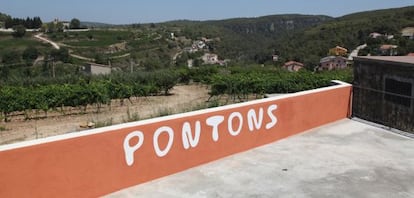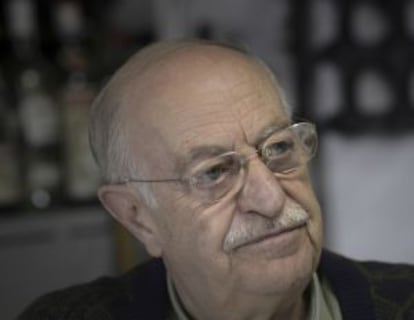Catalonia’s last indomitable Popular Party-governed village
Pontons is the only Catalan municipality still ruled by the pro-Spanish conservatives

You’d be advised to take travel sickness medicine and hire a rally car driver in order to reach Pontons in condition to work up a newspaper article.
The rocks that encroach on the road and the curves that hug the River Foix only seem to exaggerate the perils of the mountain pass leading to the Catalan village.
The journey itself supports the idea of Pontons as a last indomitable redoubt – even more so considering that the tiny municipality, perched on the border between the provinces of Barcelona and Tarragona, flies the last flag of the conservative Popular Party (PP) in all of Catalonia.
I don’t vote for Lluís because he belongs to the PP, God forbid that I should – I do it because he is a good mayor”
Pontons pensioner
Credit for that goes to Mayor Lluís Caldentey. Or rather to the trust deposited in him for the last 16 years by the local residents.
Caldentey is used to winning absolute majorities, but his victory in this year’s May 24 election was particularly symbolic: as the last remaining PP strongholds of Badalona and Castelldefels fell to opposition coalitions, the conservative party seemed gone from Catalonia altogether. But not quite. This one tiny dot on the map continued to hold out, much like Asterix’s village of Gauls in the comic books.
This impression is augmented by the mayor himself, who sports a large mustache not unlike that of the cartoon warrior. Like Asterix, Caldentey continues to resist in a land ruled mostly by Catalan nationalists.
Caldentey is proud of going against the grain. Pontons was just one of five Catalan municipalities (out of a thousand or so) that refused to hold an informal referendum on independence in November of last year.
The town hall also flies the Spanish flag, flouting the predominant trend of Catalan-only symbols in the surrounding Penedés district.
Lluís Caldentey seems to be aware that he has become something of an exotic figure, a political anomaly that makes people feel more compassion than fear. Part of the reason is that the entire population of Pontons barely numbers 500 inhabitants.

“Without any squatters or Arabs, let’s make that clear,” he adds.
It is abundantly obvious that the mayor is a man with very conservative and incendiary views. Otherwise his adversaries would not portray him as an heir to Franco’s ideas, nor would he have risked disciplinary action for stating that homosexuals are loonies.
Caldentey now regrets having used that word. Or maybe not that much, since during the course of this interview, held inside the garage of his home, he had the following to say about the 2005 law that allowed same-sex marriage in Spain.
“What I said is that fags should not marry. God created man and woman. Homosexuality is an anomaly. I promised I wouldn’t marry them and I have kept my word. Not that they are lining up to ask me to.”
Caldentey certainly keeps his word. He also boasts about putting his campaign promises up for public scrutiny every time his term ends. He has promised to serve his village for 20 years – he is now 74.
Despite the fervent display of popular support he enjoys at the polls, this does not necessarily reflect ideological affinities. His neighbors vote for his efficiency, his personality, his sense of philanthropy – he doesn’t receive a single euro for his work – but a survey of local residents suggests that Catalan secessionism could have made greater inroads in Pontons than the mayor suspects.
Lluís Caldentey seems to be aware that he has become something of an exotic figure
The first house in the village is a reminder of that. The estelada – the unofficial Catalan flag used by secessionists – that hangs there is driving Caldentey crazy, and serves as a warning sign of the ongoing siege by the surrounding “Romans.”
“I don’t vote for Lluís because he belongs to the PP, God forbid that I should – I do it because he is a good mayor,” says a pensioner sitting inside the local bar. “He works hard for us and has managed to carry us forward during difficult times, through rural tourism and our farming resources.”
This local resident is talking about their prosperous land and the reputation of its cava wineries, particularly the Xamos estate. Its owner, Josep Tutusaus, is deputy mayor, and admits that the four local PP representatives (there are three pro-independence councilors in the opposition) have become something of an anachronism.
Certainly, the mayor’s garage exudes a certain air of the past. Rosaries, farming tools and a signed photograph of former PP Prime Minister José María Aznar create a sepia-tinged atmosphere that Lluís Caldentey contaminates by chain-smoking American cigarettes.
“So I’m very right-wing,” he says. “So what?”
English version by Susana Urra
Saving a nationalist icon
Pontons Mayor Lluís Caldentey feels that neither he nor his children will ever see Catalonia become independent. It would be "a general tragedy," he says.
In fact, it would also be a personal tragedy, since one of the most famous episodes in the history of the Caldentey family involves the mayor's mother, who hid a young Jordi Pujol – the man who would go on to become the founding father of the Catalan nationalist movement – inside her inn to save him from the Francoist officials out looking for him.
"Given the way things have turned out, I'm not sure we did the right thing," says the mayor, ironically.
Tu suscripción se está usando en otro dispositivo
¿Quieres añadir otro usuario a tu suscripción?
Si continúas leyendo en este dispositivo, no se podrá leer en el otro.
FlechaTu suscripción se está usando en otro dispositivo y solo puedes acceder a EL PAÍS desde un dispositivo a la vez.
Si quieres compartir tu cuenta, cambia tu suscripción a la modalidad Premium, así podrás añadir otro usuario. Cada uno accederá con su propia cuenta de email, lo que os permitirá personalizar vuestra experiencia en EL PAÍS.
En el caso de no saber quién está usando tu cuenta, te recomendamos cambiar tu contraseña aquí.
Si decides continuar compartiendo tu cuenta, este mensaje se mostrará en tu dispositivo y en el de la otra persona que está usando tu cuenta de forma indefinida, afectando a tu experiencia de lectura. Puedes consultar aquí los términos y condiciones de la suscripción digital.








































